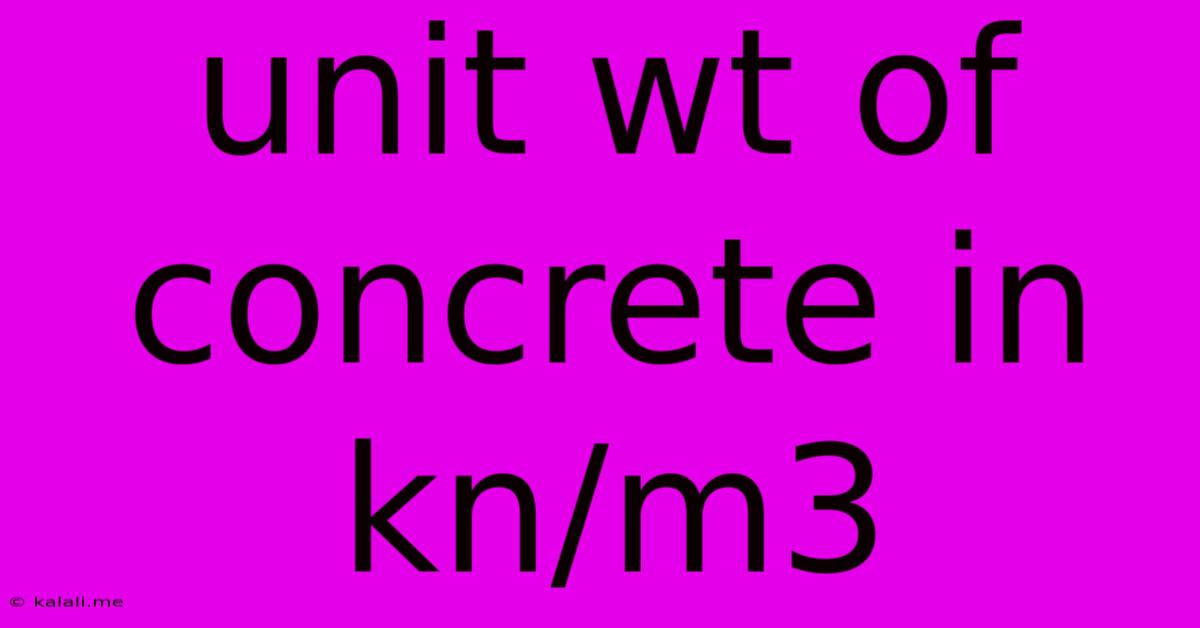Unit Wt Of Concrete In Kn/m3
Kalali
Jun 11, 2025 · 3 min read

Table of Contents
Unit Weight of Concrete in kN/m³: A Comprehensive Guide
Understanding the unit weight of concrete, expressed in kilonewtons per cubic meter (kN/m³), is crucial for various aspects of civil engineering and construction. This value directly impacts structural design calculations, material estimations, and overall project cost. This article provides a comprehensive overview of concrete unit weight, factors influencing it, and its importance in practical applications.
What is Unit Weight?
Unit weight refers to the weight of a material per unit volume. In the context of concrete, it signifies the weight of one cubic meter (m³) of concrete in kilonewtons (kN). It's a key property used in structural analysis to determine the dead load imposed by concrete structures on their supports. Knowing the unit weight allows engineers to accurately calculate stresses and deflections within the structure.
Typical Unit Weight of Concrete:
The typical unit weight of normal-weight concrete ranges from 23 to 24 kN/m³. However, this value can vary significantly depending on several factors, which we will discuss below. This range is essential for preliminary calculations and estimations. More precise values are usually determined through laboratory testing of the specific concrete mix used in a project.
Factors Affecting Concrete Unit Weight:
Several factors contribute to variations in the unit weight of concrete. These include:
-
Aggregate Type and Density: The type and density of aggregates (sand, gravel, crushed stone) used in the concrete mix significantly influence the overall unit weight. Heavier aggregates lead to higher unit weight concrete. For example, using heavier aggregates like basalt will result in a higher unit weight compared to using lightweight aggregates like expanded clay.
-
Water-Cement Ratio: The water-cement ratio affects the porosity of the hardened concrete. A higher water-cement ratio results in a more porous concrete, leading to a lower unit weight. Conversely, a lower water-cement ratio produces denser concrete with a higher unit weight.
-
Air Content: Entrapped air in the concrete mix reduces the overall density and hence the unit weight. Air entrainment is sometimes intentionally added to improve concrete's resistance to freeze-thaw cycles, but it also lowers the unit weight.
-
Concrete Mix Design: The specific proportions of cement, aggregates, and water in the concrete mix directly affect its density and unit weight. Variations in the mix design will lead to variations in the final unit weight of the hardened concrete.
-
Curing Conditions: The curing process impacts the hydration of cement and the final density of the concrete. Proper curing leads to a denser, higher unit weight concrete compared to poorly cured concrete.
Importance of Accurate Unit Weight Determination:
Accurate determination of the unit weight is vital for several reasons:
-
Structural Design: It’s a fundamental input in structural design calculations for determining dead loads and stresses on structural members. Incorrect unit weight can lead to inaccurate structural design and potential safety issues.
-
Material Estimation: Accurate unit weight is crucial for estimating the amount of concrete needed for a project. Using an incorrect value can lead to significant over- or under-estimation of materials, impacting project cost and schedule.
-
Foundation Design: In foundation design, the unit weight is used to calculate the bearing pressure exerted by the structure on the soil. This is essential for ensuring the stability of the foundation.
-
Cost Estimation: The unit weight directly influences the overall cost of the project, affecting both material costs and labor costs.
Conclusion:
The unit weight of concrete, expressed in kN/m³, is a critical parameter in concrete design and construction. While a typical range exists, variations are possible due to several factors influencing concrete density. Accurate determination of the unit weight through laboratory testing or relying on established design codes is vital for ensuring accurate structural design, material estimation, and overall project success. Understanding these factors allows engineers and construction professionals to make informed decisions leading to safer and more efficient projects.
Latest Posts
Latest Posts
-
Which Of The Following Disasters Has A Slow Onset
Jun 12, 2025
-
Max Moment For Simply Supported Beam
Jun 12, 2025
-
The Motion Of Earth Around The Sun Is Called
Jun 12, 2025
-
A Positive Ion Is Called A
Jun 12, 2025
-
Distinguish Between Direct And Indirect Democracy
Jun 12, 2025
Related Post
Thank you for visiting our website which covers about Unit Wt Of Concrete In Kn/m3 . We hope the information provided has been useful to you. Feel free to contact us if you have any questions or need further assistance. See you next time and don't miss to bookmark.